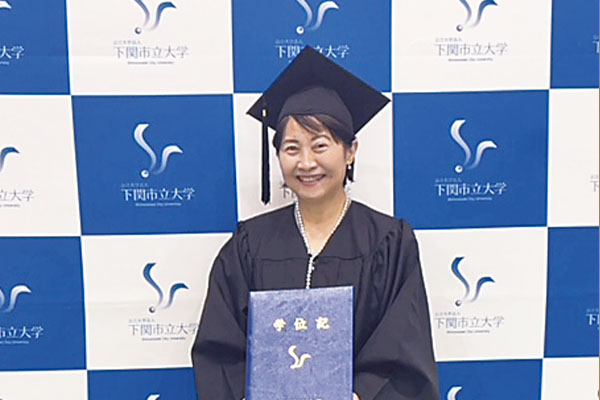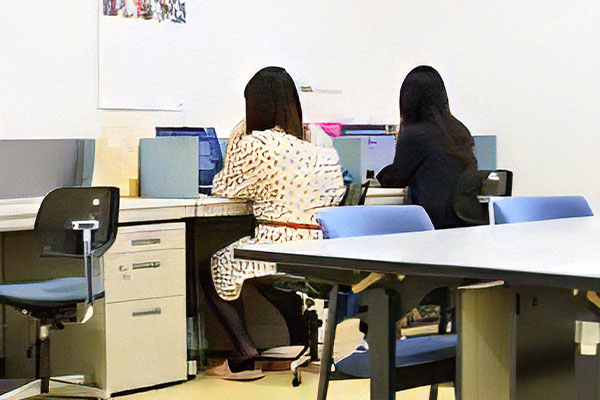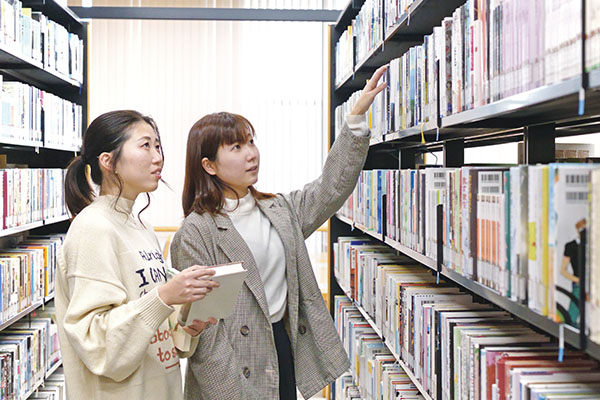- Home
- Faculty, Department, Graduate School
- Graduate School
- Graduate School Graduate School of Economics (Master's Program)
Graduate School
Graduate School Graduate School of Economics (Master's Program)

Economics and Business Administration
Open graduate schools that respond to the tide of a new era
In addition to new university graduates, we have accepted and sent out a variety of members, including active members, retired employees, and international students from Korea and China, mainly in the Shimonoseki area. The special feature of this graduate school is the small number of students. We have established an environment in which graduate students can exchange opinions based on their knowledge and experience and stimulate each other, as well as a friendly support system in which professors conduct day and night lectures and research guidance.
We also provide research guidance and classes at night, Saturday, and holidays, which are easy for working students to learn. By combining intensive lectures during the holidays (summer and winter), we will organize a timetable that allows you to obtain the necessary credits.
I look forward to the challenge of everyone who is trying to improve their career at this graduate school.
Course System
Early Course System
The Graduate School Early Course System allows students to take classes at Shimonoseki City University Graduate School Graduate School of Economics during their fourth year of undergraduate school. You can take up to 20 credits for graduate school in the fourth year of undergraduate school. Credits acquired under this program may be included in the credits required for completion at the Graduate School of the University, up to the number of credits determined by the President.
| 1st year | 2nd year | 3rd year | 4th year | Graduate School |
|---|---|---|---|---|
| First-year undergraduate students | Second-year undergraduate students | Third-year undergraduate students | 4th grade undergraduate → Graduated from undergraduate school | |
| Early course of graduate school |
Qualification
Those who fall under all of the following 1-3
①Those who are enrolled in the graduate school of Faculty of Economics at the time of course.
②Those who wish to enter the Graduate School of the University
③Those who are recognized by the Graduate School Management Council as having excellent academic performance
Long-term Course System
Those who fall under any of the following 1 to 3 and have difficulty studying at the standard training period can apply for a long-term course system and plan to take the curriculum for a certain period beyond the training period. can do.
Qualification
①Persons who have occupations and work (including those who are not regular employees and mainly live their income)
②Persons with circumstances such as childcare, long-term care, etc.
③Those who have illness or other unavoidable circumstances and are recognized by President as having difficulty in studying during the standard period of study.
The total amount of tuition and insurance premiums when using the long-term course system is as follows. (Unit: yen)
| 1st year | 2nd year | 3rd year | 4th year | Total | Student education and research disaster accident insurance premiums | Gakken incidental liability insurance premiums | |
|---|---|---|---|---|---|---|---|
| Normal case | 535,800 | 535,800 | 1,071,600 | 1,400 | 680 | ||
| For long-term courses of 3 years | 357,200 | 357,200 | 357,200 | 1,071,600 | 2,100 | 1,020 | |
| For long-term courses of 4 years | 267,900 | 267,900 | 267,900 | 267,900 | 1,071,600 | 2,650 | 1,360 |
Courses and research/educational content
Common Courses
| Special Economics I and II | I will explain the major trend of economics, taking into account various problems facing modern economies. |
| Project Research I and II | Set research themes related to social issues, conduct appropriate research, and complete the papers. |
Economic Community Systems and International Business Concentration Subjects
| Microeconomic Research I and II | Research on theoretical models of microeconomics and their analysis |
| Economic Principal Research I and II | Marx Economics of Capital Theory, Particularly Research on Financial Crisis and Depression |
| Economic Research I and II | Research on finance and corporate finance (corporate financing) |
| Industrial Organization Research I and II | Theoretical and empirical research of industrial organizations |
| Community Studies I and II | Research on community development related to industry-private collaboration society |
| Regional Policy Research I and II | Research on Industrial Locations and Regional Policy |
| Urban Policy Research I and II | Research on various problems in Japanese cities and policies aimed at solving them. |
| Business Administration Research I and II | Research on the theory and the formation of ideas in business administration |
| Management Accounting Research I and II | Systematic research on the current status and issues of management accounting methods |
| Accounting Research I and II | Theoretical study of the Japanese accounting system in globalization |
| Marketing Research I and II | Research on marketing and international marketing of Japanese companies |
| Management Information Systems Research I and II | Research on the application of knowledge engineering in management information systems |
| International Economic Research I and II | Research on international economy, economic integration and labor movement in East Asia |
Department of Education and Economics
| Special Theory of Education Economics I and II | Using theoretical and analytical methods that have been confirmed to be useful in economics, we will elucidate policies and issues related to education. |
| Analysis of Economic Issues in Education I and II | I will discuss the formation of human capital, an important issue in modern economies, from the perspective of economic theory and policy. |
| Social Science Research Methodology | I will explain how to conduct research in social sciences and how to write papers. |
| Measurement and Quantitative Methodology | I will explain statistical methods for implementing educational and research issues. |
| Social Data Analysis (Infant Education) Special Theory I and II |
We discuss evidence-based childcare practices and data analysis methods in the field of infant education. |
| Social Data Analysis (Organizational Management) Special Theory I and II |
Research on evidence-based data manipulation and analytical skills in human resource management |
| Understanding research ethics | Research on the significance and importance of research ethics, fairness, and misconduct as basic matters of research ethics. |
A person in charge may be added. Please contact us for more information.
Introduction of class subjects
Special Economics I
In Economics Specialist I, we explain the major flow of economics in order to understand the basics and history of economics. In addition, in order to learn economics, it is important to have an interest in the major economic issues of modern society. Therefore, in order to be aware of the problem of the modern economy, we will discuss exciting topics such as population decline and the development of high-quality human resources, investment in human capital, technological innovation, economic growth and financial crisis, fiscal and financial policy responses, and capitalism growth and stagnation.

Message from the President of the Graduate School
Professor Tsuyoshi Saruwatari
Today, with the aging of children and the advancement of globalization, Japan needs a high degree of dedicated professionals who have a dedicated knowledge to open up a new era. Shimonoseki City University Graduate School of Education and Economics, Graduate School of Economics aims to develop specialized professionals in the field of education and economics with Economic Community Systems and International Business Concentration.
If you are considering entering a graduate school after graduating from university, you have many possibilities. Possibilities are demonstrated in the challenge of various things. Please be interested in as many things as possible and continue to challenge boldly. Then, even if he fails, he analyzes why he did not work, and works to make use of that failure in the next challenge. Let's learn such thoughts and actions together at Shimonoseki City University Graduate School.

Alumni VOICE
Mr. Ryuichi Shibata
Theoretical research on accounting fraud issues - focusing on information disclosure systems -
After deciding to enter graduate school, I thought deeply about how to read related books and how to make use of what I learned in the seminar when preparing the research plan.
In the current research, "game theory" in the field of economics allows you to find out which one is best to choose if you have multiple options. We are also researching how to apply this field to prevent accounting fraud. It can be guessed that fraud will work because it feels great for the individual or company, but by introducing appropriate accounting regulations here, it is possible to prevent it beforehand. The concept of "game theory" can be applied to a wide range of businesses.
In the future, as an IT engineer, I will be involved in the work of supporting accounting firms and other organizations, but I would like to make full use of the knowledge I have gained through research and the knowledge I have acquired in IT, marketing, management theory, etc., to promote services.

Alumni VOICE
Mr. Kiyomi Utagawa
Analysis of the effects of physical and human environmental factors on concept formation in 1.2 year olds-Focusing on CRAYON BOOK data-
During the operation of nursery schools, etc., there was no specific content on what kind of education was needed at the nursery site. . Therefore, I conducted a study with the aim of helping nursery teachers and child-rearing families by analyzing and considering using the tool "CRAYON BOOK" to visualize how children acquire growth in what environment. . Analyzing the behavior of children growing every day was often understood for the first time, such as not always the same results, but when the hypotheses made in the research and the analysis results were connected, such steady efforts were made to raise children I realized that it could be useful for raising children. In graduate school, I was able to deepen my learning with seminar members of different research content, age, and occupation, reaffirmed the meaning of the 100-year life and led to confidence.
Currently, I am managing it at childcare sites, and I would like to continue my research so that nursery teachers can understand and respond to the growth that has been visualized through research.
Research facilities

Graduate School Lecture Room, etc.
On the 3rd floor of Building II, there are two lecture rooms for graduate schools, an exercise room, and a joint laboratory that accommodates about 10 people each. Each room is equipped with desks, computers, lockers, tables, etc. This space allows students to engage in individual learning and research, rest between research and classes, and use it to interact with other students.

Library of Shimonoseki City University
Located in Library and Study Center Building, Library of Shimonoseki City University has approximately 250,000 books and other specialized magazines and materials available. The opening hours are as follows, and are also available for graduate school night classes.







